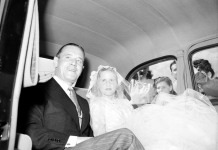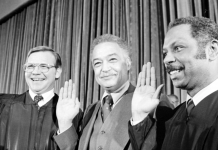
1980When it came to crossing musical boundaries, Aretha Franklin (1942-2018) covered more territory than Lewis and Clark. R&B and soul are the genres she is best known for, but her first studio album in 1961 was a collaboration with jazz musicians The Ray Bryant Combo. She could dial down the volume with a standard romantic ballad, such as Hoagy Carmichael’s “Skylark,” or blast through a rock classic like “Jumpin’ Jack Flash.” Aretha even tested the classical waters when she stood in for an indisposed Luciano Pavarotti at the 1998 Grammy Awards and sailed through an unconventional but alluring rendition of Puccini’s aria “Nessun dorma.” But it was gospel music that was her first love, and one that she never abandoned. Singing “Precious Lord” was as natural to her as “Chain of Fools.” She developed her affinity for gospel at Detroit’s New Bethel Baptist Church, led by her father, the Rev. C.L. Franklin. It was her father who, in spirit, was at the center of a March 24, 1980, gospel concert at Cobo Hall. In 1979, C.L. Franklin had been shot twice in his Detroit home, in what was an apparent robbery. He remained in a coma for five years, until his death. At the benefit concert, his daughter was the main draw, of course, but The Staple Singers and the Revs. James Cleveland and Jesse Jackson also took to the stage. A somewhat pensive-looking Aretha is seen here performing that night. The year 1980 proved to be a pivotal one for the singer. After a long run at Atlantic Records, she moved to a new label, Arista. She also had a memorable turn in the 1980 film The Blues Brothers, in which she played a no-nonsense waitress who served up a sassy version of her 1968 hit “Think.” One of the backup singers in that flick was her younger sister, Carolyn. The Queen of Soul’s career was gaining steam again, but she hated the word “comeback.” As she once said, “Don’t say Aretha’s making a comeback, because I’ve never been away.” Judging from Detroiters’ outpouring of affection after her death, she’s not likely to fade away, either.
|
|
|









